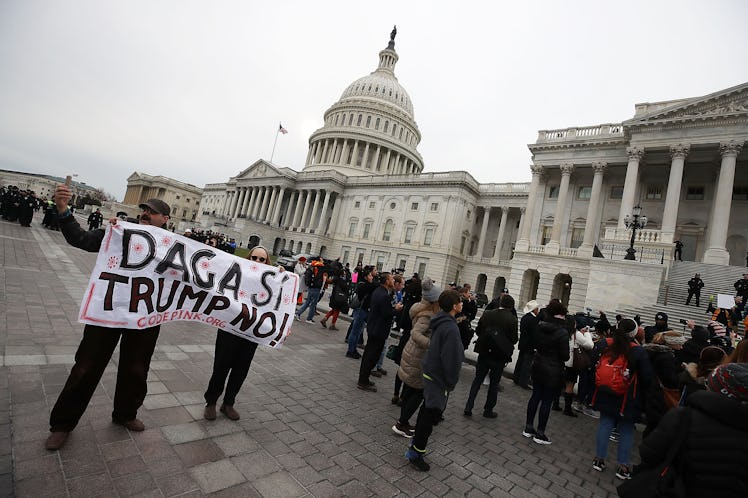
Trump Isn't Expected To Extend DACA Deadline, So Dreamers May Be In Trouble
Last year, President Donald Trump announced a Mar. 5 expiration date for the Deferred Action for Childhood Arrivals (DACA) program. As that date gets closer and closer, Congress is scrambling to reach an agreement on immigration, a negotiation that has impeded the federal budget. But a White House official says it's doubtful Trump will extend the DACA deadline.
On Tuesday, Feb. 5, White House Chief of Staff John Kelly told reporters on Capitol Hill that it's unlikely Trump will extend the deadline to allow Congress more time to negotiate. The program protects some 700,000 young immigrants brought to the country as children (aka Dreamers) to continue living and working while shielding them from deportation.
"I doubt very much" that Trump would move the date back, Kelly said, per The Washington Post. Trump announced his intention to do away with the program in September, later following up to give Congress a six-month window in which to reach a deal about what will happen to Dreamers before the changes would take effect.
The pressure has been mounting over the last couple of months as the fate of immigrants has become a flashpoint in trying to pass the 2018 budget, with Democrats using protection for Dreamers and a longterm solution on citizenship as leverage in budget talks.
"Any deal on DACA that does not include STRONG border security and the desperately needed WALL is a total waste of time," tweeted Trump on Feb. 5. "March 5th is rapidly approaching and the Dems seem not to care about DACA. Make a deal!"
If the Mar. 5 deadline wasn't enough to pressure Congress to make a deal, there's another deadline they have to meet — and that's in two days. After months of unsuccessful negotiations on the budget (and on immigration), Congress has until Thursday, Feb. 8 to reach a spending deal to keep the lights on for the federal government before it shuts down.
"Pretty remarkable," wrote Politico's Jake Sherman on Twitter. "As we approach another shutdown this week, there is almost no talk about the deal including language for DACA." Whereas the last round of spending bill drama was marked by fierce heel-digging over protections for Dreamers, both parties have been oddly quiet this week on the topic of immigration.
The DACA program officially expires on Mar. 5, but as one user pointed out on Twitter, the effects have already been felt. While Congress has another month to make a decision, thousands of DACA recipients have already been impacted by an Oct. 5 deadline for renewal. Whether due to improper notice to applicants or to fumbles on the part of the delivery service, deadlines were missed, according to reports by Vox and The New York Times.
A court order last month required the Department of Homeland Security to continue processing DACA applications until further notice. While the program currently has 700,000 beneficiaries, the number of eligible applicants is estimated at 1.3 million, per the Migration Policy Institute.
Per The Post, the White House on Monday rejected a proposal by Senators John McCain (R-AZ) and Christopher Coons (D-DE) to improve border security while allowing a path for permanent legal status for immigrants. In recent budget talks, Trump has pushed for including funding for a border wall with Mexico in the budget.
DACA isn't the only demand being discussed in budget talks. Disaster relief funding, health programs, and the debt ceiling are also on the table. Funding for the Children's Health Insurance Program (CHIP) and defense spending have been other points of contention, so it's a tall order to make the long-term budget pleasing to everyone.
The GOP needs bipartisan support to pass the bill through the Senate, which requires 60 votes to pass. Currently, it's unlikely that they'd have the votes to pass any long-term solution at this point unless they can reconcile their differences on immigration.
Shy of passing a long-term spending bill, Congress is expected to opt for passing a short-term stopgap measure, formally called a Continuing Resolution (CR). If lawmakers take this Band-Aid route, that would make it the fifth short-term solution in Congress' attempts to get the 2018 budget approved. A January attempt to pass a CR initially failed, causing the government to shutdown on Jan. 19. The shutdown ended Jan. 22 after leaders from both parties reached a deal to fund the government through Feb. 8.
One option being discussed is a short-term stopgap measure that would extend funding through Mar. 22 or 23, per Politico, and would separate the budget negotiations from the DACA debate. The immigration battle would follow after a budget has been approved.